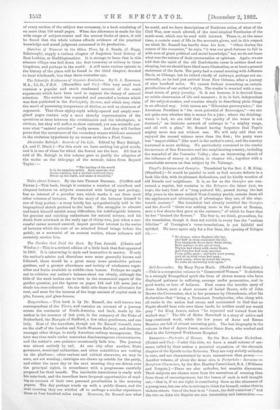Hesperoihen.—This book is by Dr. Russell, the well-known war correspondent
of the Times, and contains an account of a journey across the continent of North-America and back, made by the author in the summer of last year, in the company of the Duke of Sutherland, the Marquis of Stafford, a few other gentlemen, and one lady. Most of the travellers, though not Dr. Russell himself, were on the staff of the London and North-Western Railway, and desirous, amongst other things, to study American railway management. The tour was thus made under somewhat disadvantageous circumstances, and the author's own patience occasionally fails him. The journey was almost entirely by rail. At one city after another, State governors, municipal authorities, and other notabilities are waiting on the platform ; other curious and critical observers, we may be cure, are not wanting ; carriages are drawn up outside for the party, and either the same day or the next morning they are driven over the principal sights, in accordance with a programme carefully prepared for their benefit. The inevitable interviewer is ready with his note-book, and the travellers have frequent opportunities of read- ing an account of their own personal peculiarities in the morning papers. The day perhaps winds up with a public dinner, and the next morning they are whirled off to undergo a similar experience three or four hundred miles away. However, Dr. Russell saw what
he could, and we have descriptions of Northern cities, of sites of the Civil War, now much altered, of the semi-tropical Territories of the south-west, which can be read with interest. There is, at the same time, a certain want of life in the accounts given; and in this respect we think Dr. Russell line hardly done his best. " Often during the course of the excursion," he says, "it was our good-fortune to fall in with men of great political and social knowledge," but we do not learn what was the nature of their conversation or opinions. Again, we are told that the spirit of the old Confederate cause is neither dead nor sleeping, but we should have liked more illustration, or at least a general statement of the facts. The party had a casual meeting with Jefferson Davis, at Chicago, but he talked chiefly of railways, perhaps not un- naturally, as he had just arrived' from New Orleans, after a journey of nine hundred miles. We cannot forbear remarking on certain peculiarities of our author's style. The reader is wearied with a con- stant strain of petty jocosity. It is not humour, it is derived from no subtle observation of life and manners ; it is, in fact, independent of the subject-matter, and consists simply in describing plain things in an affected way. Irish names are "Hibernian patronymics ;" the American President is "the most potential of Bovereigns,"—we are not quite sure whether this is meant for a joke; where the drinking- water is bad, we are told that "the quality of the water is not strained ;" an intricate network of railways is "a mighty range, and all with a plan," Dr. Russell having forgotten that Pope's mighty maze was not without one. We will only add that we enjoyed the second volume more than the first ; the party were less "mayor-ridden" (the word is the author's own), and the country traversed is more striking. We particularly commend to the reader the account of San Francisco and the neighbouring country, including the waterfall of the Yosemite Valley ; also an interesting sketch of the influence of money in politics, in chapter viii., together with a remarkable sermon on that subject by Dr. Talmage.






































 Previous page
Previous page